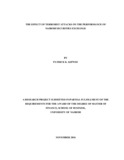| dc.description.abstract | Stock markets are critical drivers of economic growth given their role in savings mobilization and allocation of resources to productive sectors in any economy. The performance of stock markets are, however, affected by a myriad of factors including uncertain political transitions, conflicts, war, and terrorist attacks. The frequency and severity of terrorist attacks has been on the increase with most countries being exposed to its negative impacts. Terrorist attacks are therefore critical events to financial markets since they create uncertainty and increase investment risks thus affecting trading. Kenya has borne the brunt of terrorist attacks especially since the country deployed its military into Somali in 2011 in pursuit of Al Shabaab terrorists who had previous carried out sporadic attacks in the Kenyan Coast targeting mainly tourists. This study sought to establish the effect of terrorist attacks on the performance of Nairobi Securities Exchange (NSE) and it adopted event study methodology. The Westgate (2013), Lamu - Mpeketoni (2014) and Garissa University (2015) attacks were considered given that they are the most recent and major attacks on the basis of life and property lost. Data from NSE was utilized and analyzed using Microsoft Excel before being presented in tables and graphs. The study established that Average Abnormal Return (AAR) reduced in the event period for all the attacks, although to a lesser extent for Westgate, and it was statistically significant at 5% level. Analysis of Cumulative Average Abnormal Return (CAAR) revealed that Garissa and Lamu attacks had significant negative effect on the performance of Nairobi Securities Exchange. CAAR analysis for Westgate attack indicated no impact but it is clear from graphical analysis that over a shorter event window the attack negatively affected the Nairobi Securities Exchange. Since CAAR was negative/declining for all events, the study concludes that terrorist attacks indeed affect negatively the performance of Nairobi Securities Exchange. The study suggests a broader study considering more terrorist attacks and using several event window periods while using both primary and secondary data in order to arrive at a more reliable conclusion. It is recommended that investors should diversify their portfolios to cushion themselves from the negative effect on terrorist attacks while the government should enhance anti-terrorism initiatives and counter misinformation on terrorist attacks in order to reduce panic among investors which compounds the negative impact of such attacks. | en_US |



